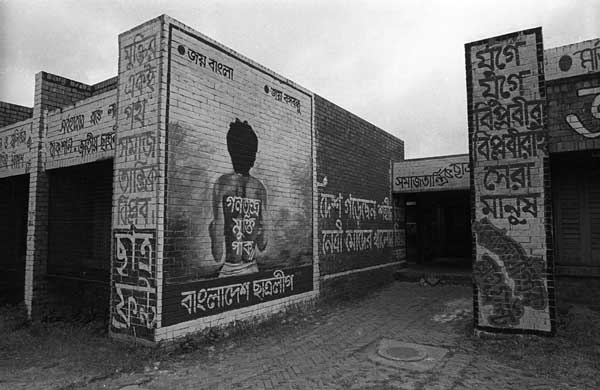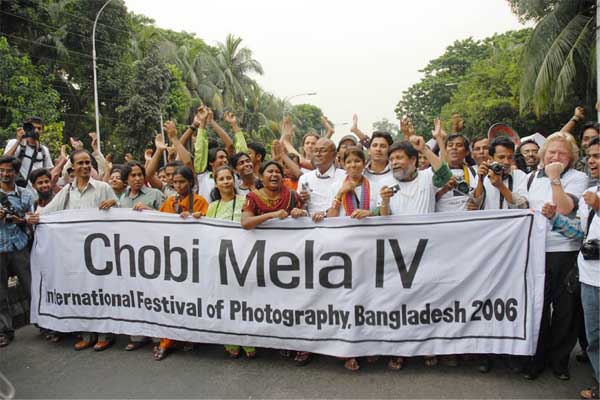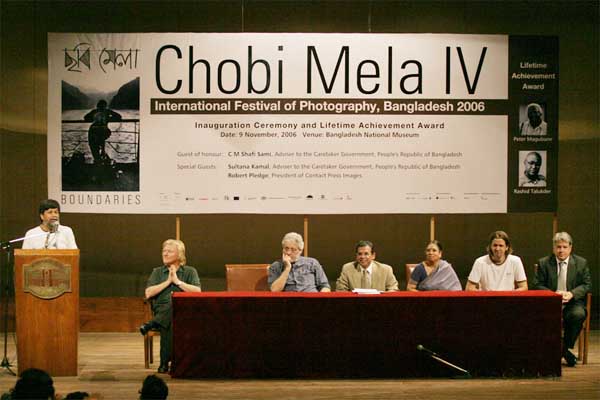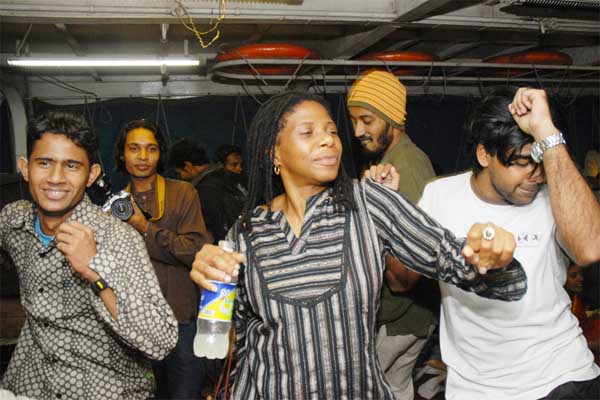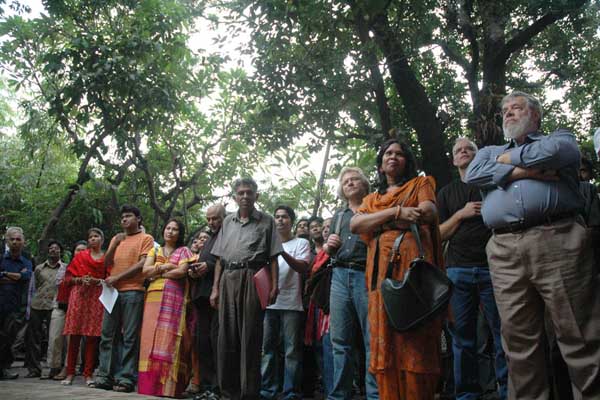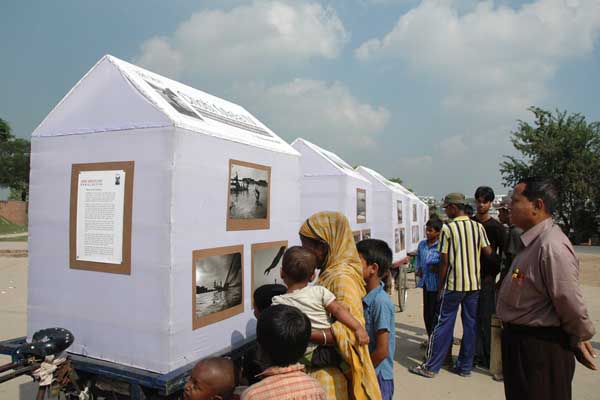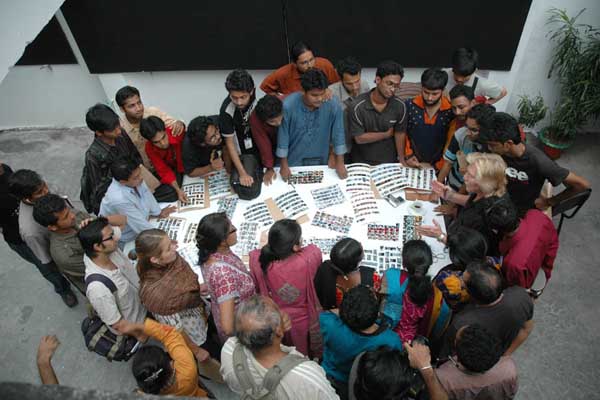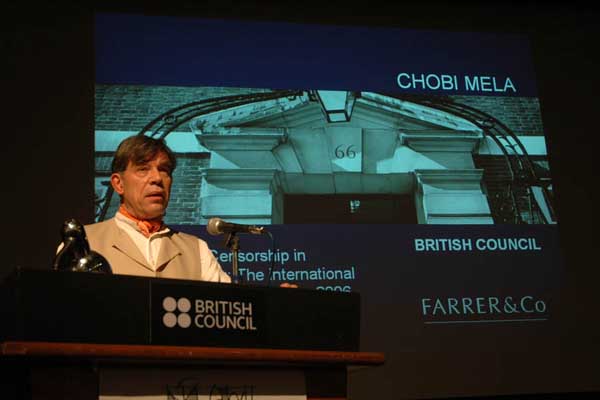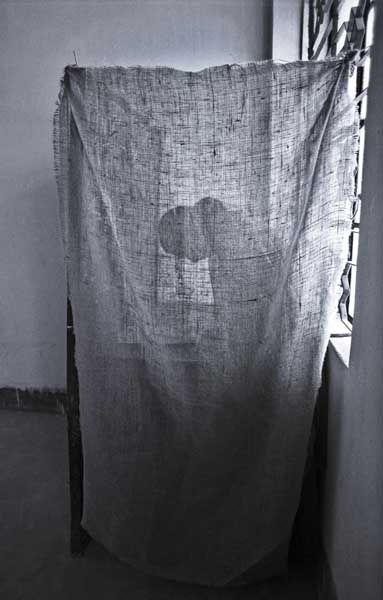![]()

20th anniversary of Ain O Salish Kendra and National Museum auditorium, Dhaka. Bangladesh

Fazle Hasan Abed (left), Muhammad Yunus (centre) and George Soros (right)
Muhammad Yunus, Amartya Sen, Fazle Hasan Abed, George Soros Sultana Kamal. I could hardly have asked for a better photo op. Well it is Christmas! If ever a nation was in need of a pick me up, this was it. The twentieth anniversary of Ain O Shalish Kendra (ASK) had a special significance. This was an organization that has been relentlessly fighting for the rights of the downtrodden. Despite the central bank predicting a 7 percent growth in the coming year, with both parties poised to contest the upcoming election choosing to woo the autocratic general the people had fought to overthrow, and the traditionally secular Awami League (AL) selling out to the Bangladesh Khelafat Majlish (BKM) for supposed electoral gains, the people needed the assurance that at least some still believed in a secular state and the interests of common people.

Amartya Sen lauded ASK and women?s agencies for the role they had played in upholding the rights of women and talked of the importance of freedom of speech.

Muhammad Yunus reminded the audience of ASK?s role in preserving the legal rights of the poor. Both Nobel laureates stayed clear of commenting on the decision that had been made by the major opposition party, which had just buried all of these ideas for political convenience.

Sen gave an eloquent speech, weaving history and his own characteristic economic analysis to point to the role civil society could play in creating a more egalitarian world.

His witty anecdotes about Salma Sobhan, the diminutive but feisty human rights activist who had founded ASK, and his frank accounts of the attempts by him and his friend, our own celebrated economist Rehman Sobhan, in winning over Salma Banu, before she became Salma Sobhan, was a warm and sincere tribute to one of Bangladesh?s finest citizens. But despite the joy of celebration, the mood in the audience was less than ebullient. The high court ban on fatwas had been a hard won battle and the gloom caused by AL?s entente with the other side of the fundamentalist coin, had left everyone shattered. My activist friends were surprisingly unperturbed. ?Well, they have unmasked themselves? said Khushi Kabir, ?it is time we woke up to what the parties really represent.?

Sultana Kamal was similarly defiant but also brought up her concerns. ?It has always been our fight, and now we know what alliances to avoid. But they have effectively robbed me of my voting rights. If I now want someone in parliament to stand up for the rights of women, or the Ahmadiyyas, or for free speech, whom do I turn to? The candidates too have no choice. The few who might have wanted to enter the fray because they wanted to change things, now have no party to turn to.?
Politicians are not known for honesty and candour. AL?s win at any cost deal was defended by Abdul Jalil, the general secretary of AL who signed the document, as he tried to wriggle his way out of the hole he had dug himself into. ?It is an understanding based on an election strategy? and ?any decision is a fatwa? he rambled.
This particular election strategy seems to have left out the voters from the equation. The latest ?fatwa? by the Awami League is a ?decision? that will haunt them.
Tag: Military
Judge on the docks
![]()

?Come out we won’t shoot?, they had yelled out over the megaphone. Not the most alluring of invitations, particularly when it is from a police van surrounding your flat at midnight. They had thought we were hiding someone and after searching our rooftop had come into our flat. As they left, I had gone out to take pictures from our verandah. Rahnuma had turned up the television volume to hide the sound of the shutter on my Nikon 501, but it still seemed to make a very loud click. Luckily, I wasn?t noticed. It was the 2nd December 1990. Ershad?s autocratic government was feeling the heat. 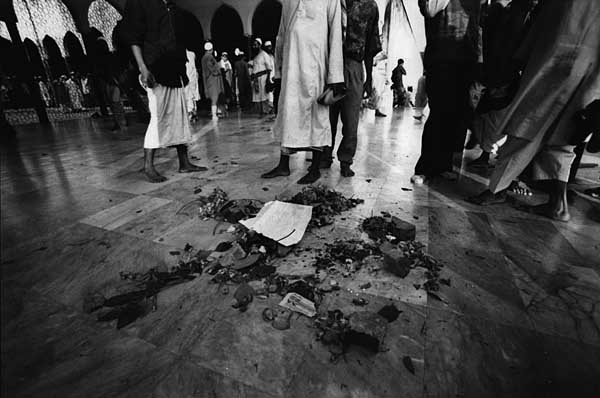
Two days earlier, after the Friday prayers, they had opened fire on the Baitul Mukarram mosque killing a man.
Lawyers had played an important role in our democracy movement. They had upheld writ petitions against the government, and when the government tried to flex its muscles, they came out in protest, united in their stand.

On this day, exactly sixteen years ago, barrister Shahjahan, Sarah Hossain and other lawyers were meant to meet at Drik. We were monitoring the government action, and were ourselves under scrutiny. My colleagues had warned me that plain clothed detectives were looking for me at the office. The detectives seemed to know we lived in Lalmatia, and my colleagues suggested that we stay elsewhere that night. Ma (Rahnuma?s mum), Rahnuma, Tehmina (a lawyer friend of ours) and I went over to Saif and Rini?s flat in Dhanmondi Rd 8. This was not the time for taking chances. The media too had played their role. When censorship became intolerable, they refused to publish. It was that night that Ershad had announced on television that he was going to step down. People were rejoicing in the streets. The following morning the first newspaper was out.
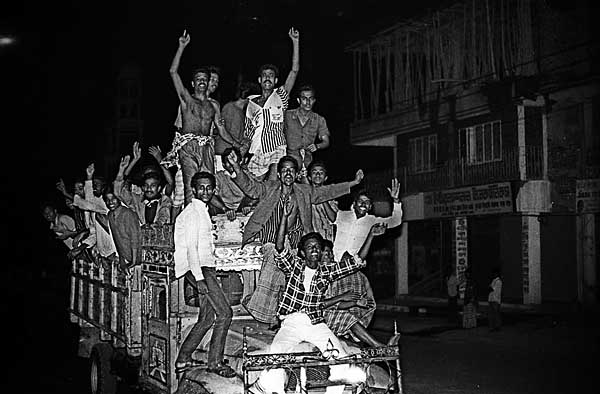

We all went out into the streets. Altaf on his motorbike, me on my bicycle, and the others in whatever transport they could find.

A little girl walked down Mirpur road with a bouquet of flowers in her hand. She too was celebrating the return of democracy. People were dancing in the streets. In Paltan, too often the scene of violence, people gathered in ones and twos.

Men and women in their sleeping clothes, some with children, gathered in the winter night. Chatpati wallas sensing a business opportunity appeared out of the fog. At about 1:30 am Shimul Billa, Bangladesh’s Shirley Temple, sang out ?Bichar poti tomar bichar korbe jara, aj jegeche ei jonota?.

The song ?O judge, the people have risen, it is now the day of your judgement?, was strangely prophetic.
And now in 2006, the chief justice of the supreme court intervenes to prevent a decision
going against a political party, lawyers ransack the court, a president with zero credibility heads a caretaker government, and of all people, Ershad himself is in the streets, demanding the removal of the current president, while Moudud, the chameleon survivor, then Ershad’s right hand man, now holds hands with the chief justice.
4th December 2006
Delhi
Stretching the Deadline
![]()
An extra day! Not unusual in itself, but considering that a deadline had been announced so long ago, it seems a strange thing to ask for. What could happen in that extra day that could not have happened before? This extra day brings fresh violence, and while the advisers give us hope of ‘light at the end of the tunnel’, it is unfortunate that yet more loss of life continues while the politicians do their tap dance. If the Chief Election Commissioner (CEC) is to step down, he should do so soon. The presence of a party appointee as head of state, head of military and head of government is bad enough. An appointee Chief Election Commissioner armed with a rigged voter list simply cannot be the basis of a fair and free election.
If there be a genuine belief in a multiparty system, the process must involve, putting in place a caretaker government with backbone, and accepting a free and fair election regardless of the outcome.
Providing electricity, ensuring wage increase for garment workers, eliminating rampant corruption and ensuring freedom from extortion and ?crossfire? are far better means of ensuring support, than empty rhetoric, paid goons and spineless sycophants in key positions. There is more blood on the streets today. It is time politicians were made accountable.
It was Nasreen’s birthday on the 18th, but though friends gathered in their Dhanmondi home and sang songs, and Jamila stayed her chirpy self, gloom pervaded the air. The article in the Daily Star brought up renewed doubts about corruption, cover-ups and selling out the country.
Pathshala alumni Monirul Alam is on vigil outside President House. The expectation is that the CEC will be bringing his resignation letter. Drik photographer Shehab Uddin is in Nepal following the peace agreement. Perhaps we too can hope for peace.
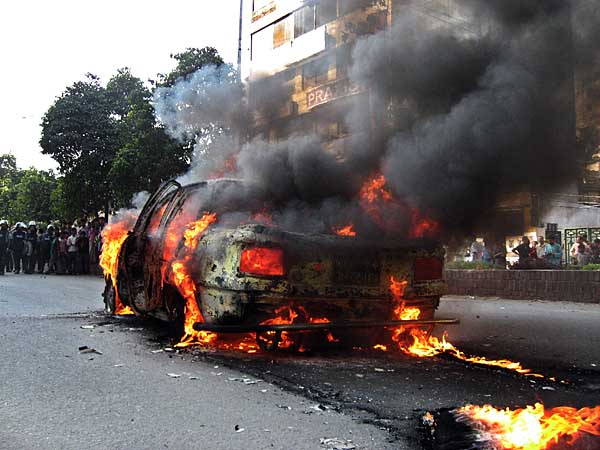
Burning car at Russel Square, close to Pathshala earlier in the afternoon.
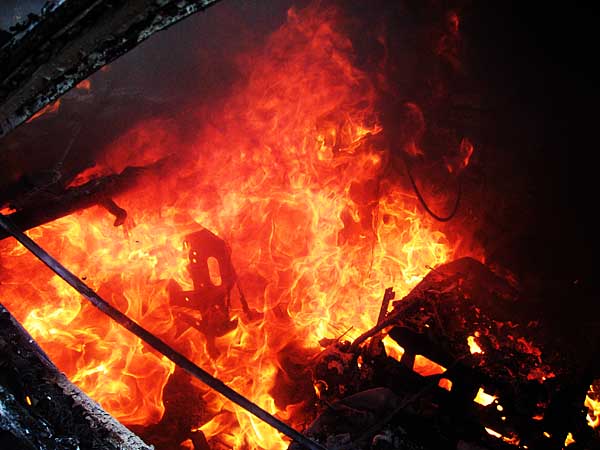
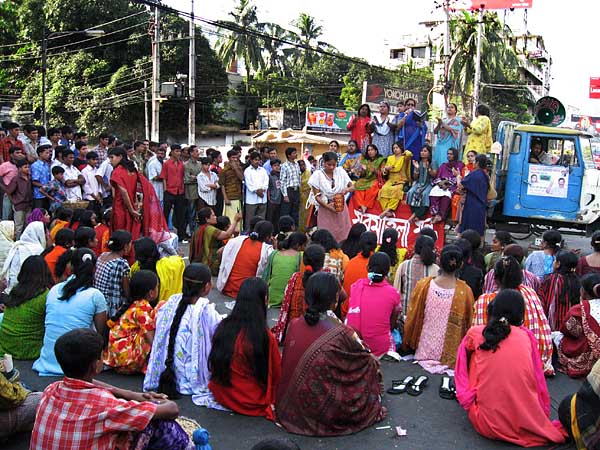
Singing in Mirpur Road
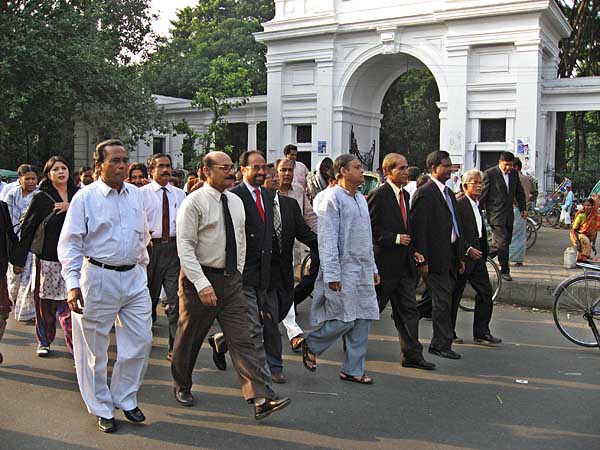
Protesting lawyers coming out of the Supreme Court
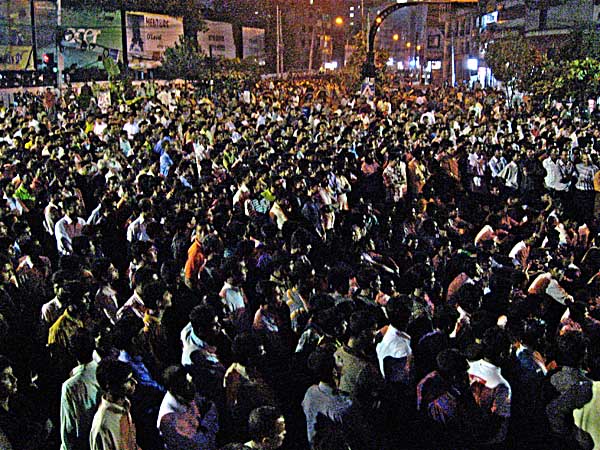
Open air concert at Russel Square last night.
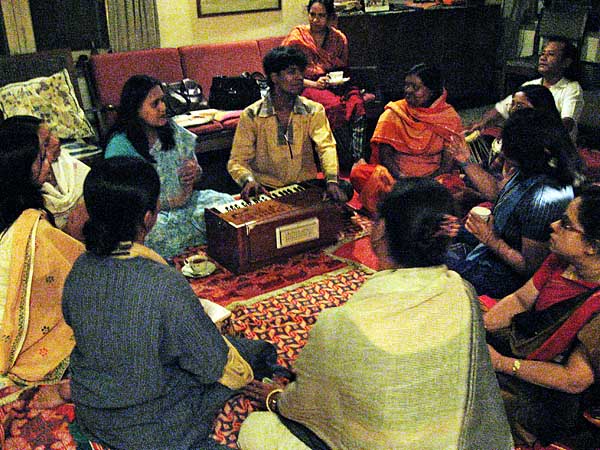
Friends singing on Nasreen’s birthday
Chobi Mela IV continues despite it all. Rashid Talukder opened the splendid exhibition resulting from Morten Krogvold’s workshop, at Shilpakala Academy.
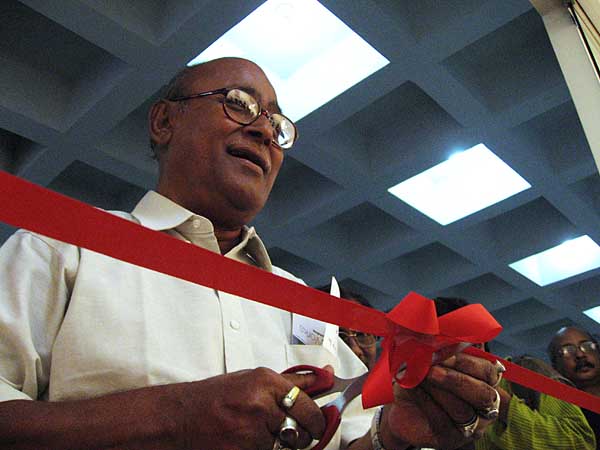
Despite my scraggly beard, Torsten thought I was Father Christmas when I went to drop off the Chobi Mela gift packs at the Goethe Institut, insisting that he teach me the German song that Santa Claus would have sung.
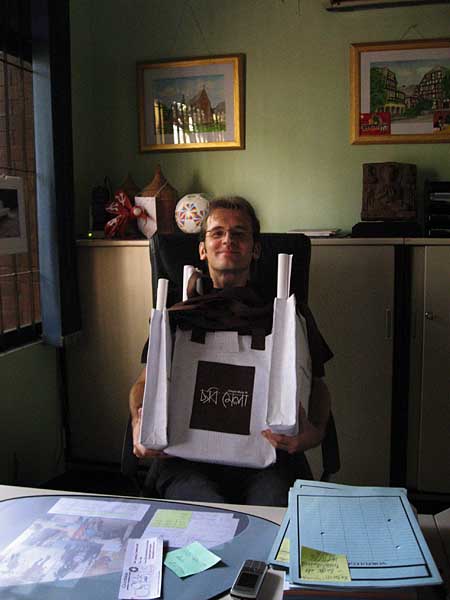
Two and a half years after the opening of the gallery, the airconditioners had still not been installed, but the viewers were not to be deterred, nor were the rag pickers outside Drik, Shanta and her friends, who decided the cool open space of Drik’s new gallery was the best place to try out their break dancing routine.
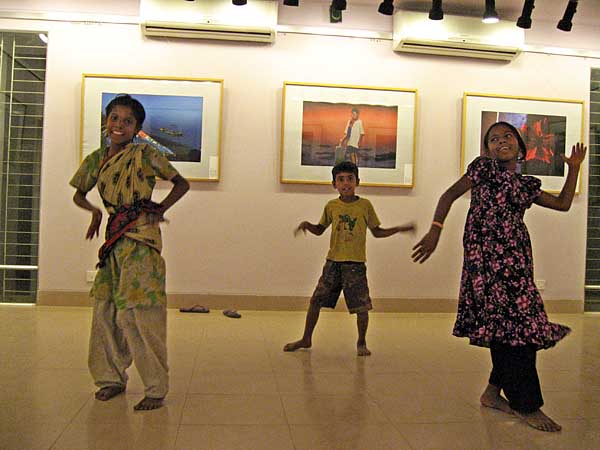
I am sure my pictures on the walls enjoyed their dance. I know I did.
Taking care of the caretaker
It was a dramatic ending to Robert Pledge?s presentation. Via Topu and Omi, I?d received the news that the military had been called out. Robert wanted to finish the presentation, but once I?d announced the government?s decision, the auditorium of the Goethe Institut quickly emptied out. This particular Chobi Mela IV presentation had come to an abrupt end. It was 1987 revisited.
Noor Hossain had painted on his back ?Let Democracy be Freed? and the police had gunned him down on the 10th November 1987. But the people had taken to the streets and while we were scared the military would come out, there was no stopping us. It had taken three more years of street protests, before the general was forced to step down. The people had won. But then it had been a military general who was ruling the country. This was a civilian caretaker government. The general mistrust of a party in power, had resulted in this unique process in Bangladesh where an interim neutral caretaker government headed by a Chief Adviser (generally the most recently retired Chief Justice) and consisting of other neutral but respected members of the public were entrusted with conducting the elections. Why then the military? Yes, the president was a Bangladesh Nationalist Party (BNP, the largest party in the outgoing coalition government) appointee, there are ten advisors who are meant to be neutral.
A free and fair election hasn?t yielded the electoral democracy we had hoped for. After each term, the people have voted out the party in power, only to be rebuffed by a political system that has never had the interest of the people on their agenda. Still, the elections were held, and despite the fact that there had been one rigged election in 1996 (rejected and held again under a neutral caretaker government), an electoral process of democratisation, was slowly developing.
This time however, the total disregard for the electoral process has created a sham, and the three key people in this electoral process, the president, the chief adviser, and the chief election commissioner (CEC), are colluding against the people. The first two, being represented by the same person, was a BNP appointee. He also happens to be the head of the military. The CEC, now a cartoon character, had also been appointed by the BNP while it was in power. Coupled with a clearly flawed voters list, this has removed any hope of a free and fair election. Can the caretaker government genuinely conduct a fair election? I believe it still can, if given the chance, despite the president?s lack of credibility. But for that to happen, the military, the bureaucracy and the police need to remember that it is with the people that their allegiance lies.
However, it does depend upon the removal of the other obstacles. The election commissioner cannot constitutionally be removed, and his removal is central to the opposition demands. What then can we do? There is only one body higher than the constitution, the people themselves. The advisors need to be empowered if they are to pull off this election. Sandwiched between a partisan executive head and another partisan CEC, the advisers risk becoming irrelevant. The only way this can be checked is if people come out in droves. Not ?hired for the day? supporters but ordinary people committed to civilian rule, and a multi-party system.
It is we the people who need to take to the streets. And it is time we sent out the message to all political parties, that an entire nation cannot be appropriated. They need to be told that we did not liberate our country in vain, and despite the poverty and the hardship that we go through, we will not be cowed down, and will not blindly tow a party line, when the party itself has disengaged from the people. If tomorrow, every woman man and child takes to the street of Bangladesh, there is no power, not the military, not the president, not the advisers, not the CEC, not the BNP and not AL that can stop us.
There is hope yet. The advisers have had the good sense to reverse the home ministry?s unilateral decision to call out the army and the president and chief adviser has been challenged for taking such a step. Whether the advisers can continue to take such bold steps depends on our ability to bolster their nebulous position.
Blockades and hartals do hurt the economy, and ironically, it is the person in the street who is the most vulnerable. But faced with an attempt to take away the only chance she has to exercise her right to elect the government of her choice, she has little option left but to take to the streets. As the world is finding out, in Iraq, in Afghanistan, and wherever else there is conflict, a military victory is never a victory. If the anger of the people is to be quelled, then the underlying causes of discontent need to be solved. Flexing the muscles of the military, will only put a lid on the boiling pot, and the longer the lid is pressed down, the bigger will be the eventual explosion. More have died today, and with every death, the flashpoint looms closer.
Chobi Mela IV has continued despite it all. The dancing in the all night boat party,
the heated arguments at every meeting point, the mobile exhibitions, all went on despite the turmoil. The presentations on the night of the 11th, with Yumi Goto, showing work by the children from Bandar Aceh, Neo Ntsoma showing her work on youth culture in South Africa, Chris Rainier showing his long term projects on ?Ancient Marks?, and the deeply personal, but very different accounts of Trent Parke
and Pablo Bartholomew, made one of the most intriguing evenings I can remember. The packed audience that had braved the blockade had perhaps an inkling of what was to come. Morten had a full house for his ?gallery walk? at the Alliance Francaise and Trent?s workshops were packed out. The grand opening was at the National Museum, where we had one fifth of the cabinet opening the show. Kollol gave a passionate rendering of his song ?Boundaries? written especially for the festival. The rickshaw vans designed to take the festival to the public, plied the streets of Old Dhaka, Mirpur and other areas not used to gallery crowds.
The chief guest, adviser C.M. Shafi Sami, the special guests adviser Sultana Kamal and Robert Pledge, photographers Morten Krogvold and Trent Parke and the scholarship recepient Dolly Akhter all spoke eloquently. Little did the audience know about the drama that had taken place the night before. With the museum functionaries doing their best to keep us from putting up the Contact Press Images show (http://www.chobimela.org/contact_press_images.php), we were under pressure, but working all through the night and sleeping on the museum floor, we managed to put the show up on time.
Last night, the empty streets, looked ominous as I dropped off Chulie, Robert and Yang, and people have been dying in the streets.
Since then we have had Morten Krogvold?s passionate presentation at the gallery walk at Alliance, Rupert Grey?s clinical dissection of the law and his dry British humour,
both at the British Council and the Goethe Institut, Saiful Huq Omi?s disturbing but powerful images of political violence, Cristobal Trejo?s poetic rendering of an unseen world, Richard Atrero De Guzman?s honest response to difficult questions about representation and my own presentation on natural disasters and their social impact have all been well attended, despite the tension in the desolate Dhaka streets. The evening presentations close tonight with an insightful film by Indian film maker Joshy Joseph, presentations by Norman Leslie and a behind the scenes look by the photographers at the Drik Photo Department, Md. Main Uddin, Shehab Uddin and Amin, Chandan Robert Rebeiro, Imtiaz Mahabub Mumit and Shumon of Pathshala and Mexican exhibitor Cristobal Trejo. The shows go on as they always do at Drik.
In 1991, a woman with her vote had avenged Noor Hossain’s death.
A fortnight ago, the city was in flames, and a stubborn chief election commissioner is stoking the flames again. It is a fire he and his allies will be powerless to stop.
Shahidul Alam
Dhaka
Chobi Mela site
Blog by Australian curator Bec Dean
Short video on Chobi Mela IV
Thailand coup d'?tat
?There?s been a coup d’?tat,? said Cherrie breaking into our meeting at the Imperial Tara Hotel in Bangkok. Some of the participants have just returned from shopping and there were little signs of the unrest that it implied. My camera had been handed in for repairs, and my first instinct was to see who had one I could borrow. Suvendu kindly and only half reluctantly offered his. Zaheer and I decided to go out, but he returned soon afterwards, seeing the pouring rain.
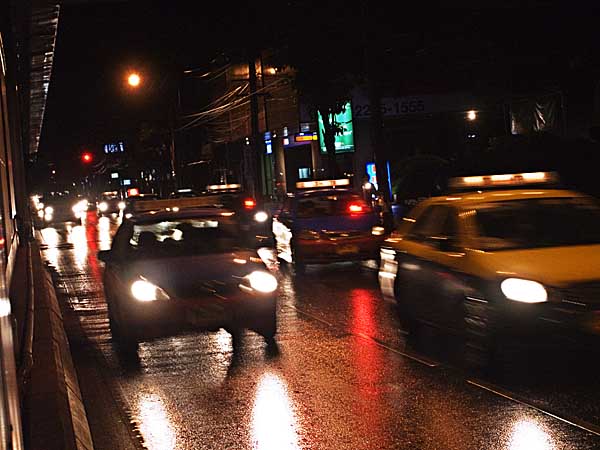
There was some housekeeping to be done. Several participants were due the next day and decisions needed to be made as to whether they should make the trip. Spending as little time as I could get away with, I clutched Suvendu?s camera and broached the rain. Some shops had closed, but there were people in the streets. The Japanese restaurant at the end of Sukhumvit Soi 26 wasn?t full, but did have customers.
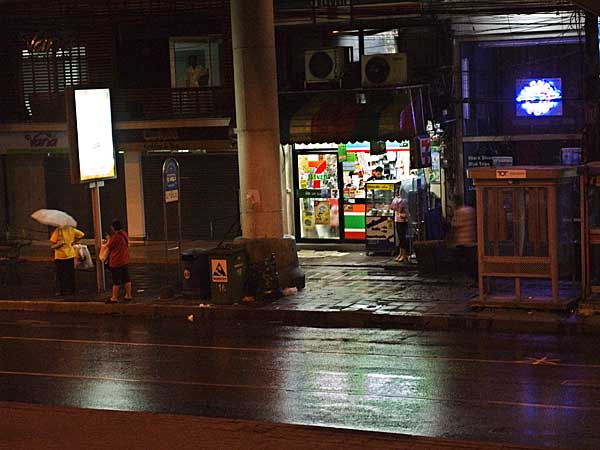
Zaheer needed a SIM card, but the girl in the 7/11 simply said ?no card?. Military takeover, or political unrest didn?t seem to pervade the air.
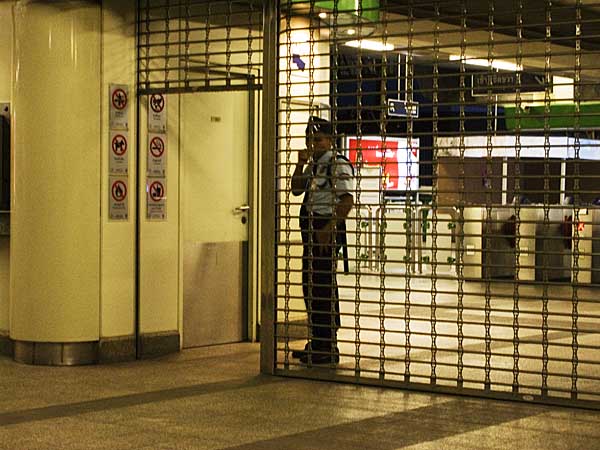
The train station was closing, perhaps a bit earlier than usual as it wasn?t midnight yet, but the traffic in the streets seemed normal. People outside the 7/11 waited for the bus as they normally do.
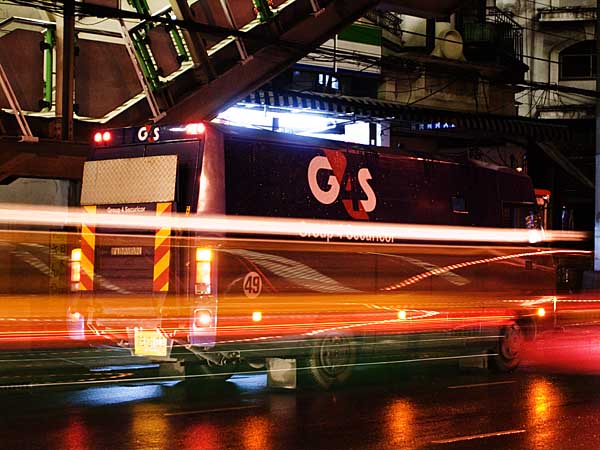
Must try and sneak out of the meeting tomorrow to go downtown where the tanks are meant to be, but here the only sign a conspiracy theorist could use as ammunition was the Securicor car waiting outside the bank. Perhaps an ominous sign.
Shahidul Alam
Imperial Tara Hotel
Bangkok
Sitting on a man’s back
![]()
Three bombs had gone off the day before, and they weren’t comfortable about me walking on my own in the streets of Kabul.
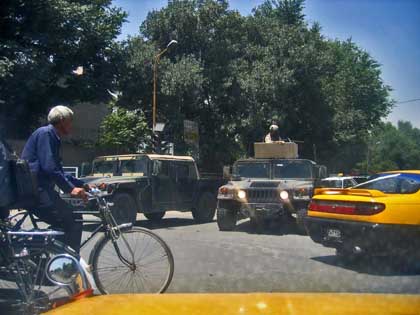
The driver insisted that he gave me a lift. The suggestion that a particular hill not too far away would give me a good view of the city was a good one, and the late evening light was just leaking through the haze. He offered to stay to give me a lift back, but I wanted to be on my own, and writing down that I needed to get back to Choroi Malek Asghar, I wandered off, free at last. Coming down the hill, I wandered through the back streets as I tend to do in cities I am new to. An odd conversation in my broken Urdu helped. As always kids wanted to be photographed, and wherever I went, people offered me cups of tea, or invited me home.
Abdul Karim latched on to me. Insisting that I visit his family, he took me through the narrow winding mud path that led to the tiny doorway that was the entrance to his home. My first task was to take photographs of the family. I had none of the language skills he had, but it didn’t seem to matter. Initially surprised by this stranger the man had brought home, the family quickly turned to more important things, like being hospitable to this mehman (guest).
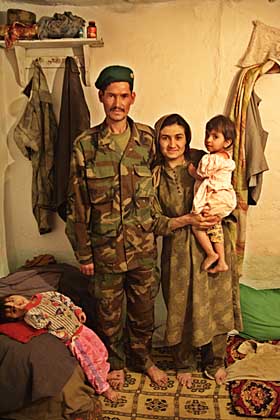
I gesticulated wildly enough to convince them that I needed to catch the light while it was there, and Abdul Karim became my self appointed guide. I could go and take some photographs, but was to come back and have tea. The sun had almost set by the time we were back up the hill. A lone runner ran circles around the flattened top of the hillock. Football fever had set in and the shouting of the kids chasing a ball in the dried up swimming pool in the centre, carried through the evening sky. Four young men came up and made conversation. Two of them had been to Pakistan, and we spoke in Urdu and in English. One was an out of work webmaster, and wanted my email address. They posed, I photographed, and he scribbled his email address so I could email the picture back.
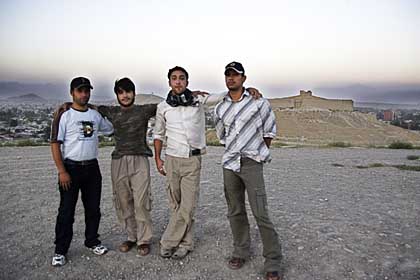
The sun had set and Abdul Karim wanted me to keep my end of the bargain. The young men also wanted me to visit their homes. Perhaps they could take me out the following day they suggested. They knew great places for photography. We exchanged mobile phone numbers. Undiplomatically, I suggested that perhaps they too could come to Abdul Karim?s and then I could go with them to their homes. One young man took me aside and explained that they couldn’t go. It would be breaking purdah. I wondered how I had become an exception to the rule.
Abdul Karim, his mother, Bibi Shirin, his wife Ayesha, and their two children Mehjebeen and Sufia lived in this one room flat. There were mattresses on the floor and one television set and one radio. There was a tiny courtyard and metal steps that went up to what looked like a loft. Abdul Karim had worked as an engineer in the marines and was now out of a job. He showed me the children’s book he used, to try and teach himself English. Even with body language and the best of intentions, our communication faltered, but there was no mistaking that I was a welcome guest, and my major challenge that evening was leaving without having dinner with the family. The path outside was by now pitch black, and Abdul Karim walked me through the maze and got me to a cab. We parted with some sadness.
Back at the Aina office where I was staying, the guard with the Kalashnikov welcomed me with a smile. I could see why my colleague Nazrul hadn’t left the compound for the last two months.
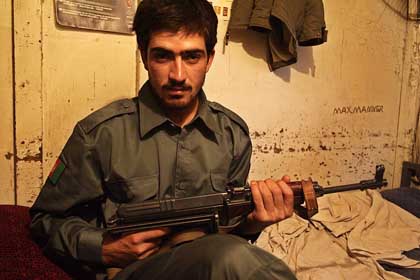
Day before yesterday we drove up to Salang, past the bombed out ruins of what had been thriving villages, past the tank carcasses, past vast stretches of barren land, interspersed with lush foliage by the river beds. A young man took great pleasure in racing his steed against our minivan. Two boys flagged me down, insisting that their friendship be recorded in my camera.
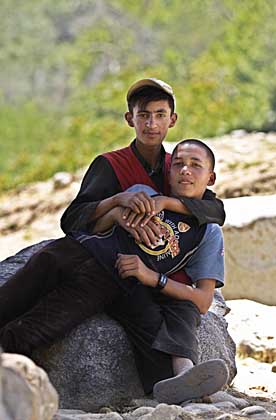
Back in Kabul, I did walk out on my own, without an escort, and went to the marketplace. The men in the bakery insisted that I try their freshly baked bread and I briefly sat with new found friends and watched Hindi films in the restaurants.
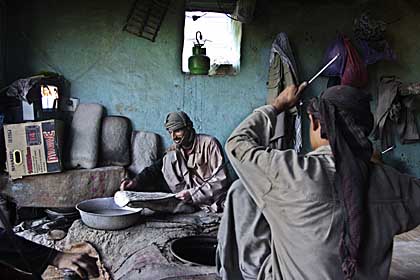
I spoke to Arif who ran a small studio, and came across the out of work labourers in the market square looking for work. A child and an old man reached into the gutter to pick up a polythene bag they could sell. It was in a worker’s face that I realized why people who are capable of so much hospitality, and are so willing to give, have become objects of terror to the foreigners who live here.
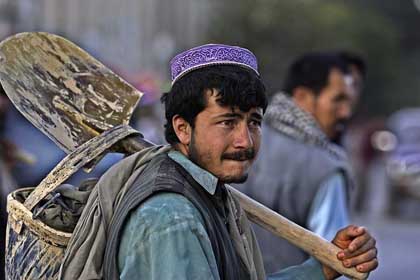
They want the very things that the west has officially championed. Jobs, security, a home for their families and for their land to be free of occupation.
Organisers at the Sarina Hotel claimed it was the first fashion show in 20 years in Afghanistan. There were few tell tale signs of the riots that had taken place here a few days ago. But the white Land Rovers outside, four sets of security barriers, and the armed US soldiers on guard, marked the distance between central Kabul and the rest of the country.
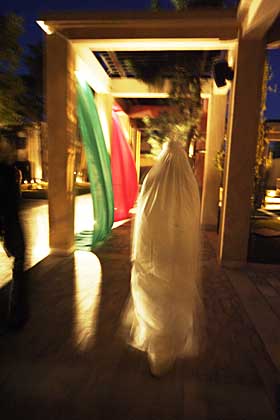
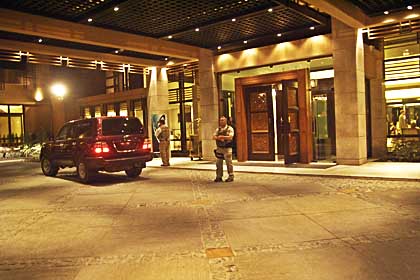
I remember Tolstoy’s words “I sit on a man’s back, choking him, and making him carry me, and yet assure myself and others that I am very sorry for him and wish to ease his lot by any means possible, except getting off his back.” They seem to have learned little in 120 years.
Choroi Malek Asghar
Kabul
9th July 2006
The Terrorist
Subscribe to ShahidulNews
![]()
The word “terrorist” was not in fashion in 1971. The Pakistanis called them “miscreants”. They called themselves the “Mukti Bahini” (freedom fighters). The ordinary Bangladeshi also called them “Muktis”, and therein lay their strength. They had limited resources, and very little training. They survived because the people risked their lives in giving them shelter, food, money, and a place to hide. They waved from the rooftops when the Mukti planes came to attack Dhaka. Trenches had been built, but they were too busy cheering to remember them, for in some ways, they too were Muktis.
Rejoicing in our independence, we quickly forgot those nine months, and treated the people in the Chittagong Hill Tracts much as the Pakistanis had treated us. The same oppression, the same genocide. The Bangladesh government called them “insurgents”. They called themselves the “Shanti Bahini”, (Peace Brigade), as did the other hill people. Shanti Bahini, years later, fought the Bangladeshi military junta, much as the Muktis had fought the Pakistanis, years before. Again the junta retaliated by killing the most vulnerable. It was the military that the people were terrified of. The Muktis and the Shanti Bahini were their saviours.
The main “terror” today is from the guns in the streets, the knee-capping, and the acid throwing. We call the people who do this, “shontrashis”. While the Muktis did strike terror in the hearts of the Pakistani soldiers, the goal was to liberate the people. The Shanti Bahini tried to defend their people from genocide. The shontrashis use terror to subjugate people into paying protection money, to gain control, to remove competition for government contracts, and to satisfy their lust. Protected by the politicians in power, the shontrashi and the junta are the only terrorists we have known.
Terror is not about danger itself, but about the fear of danger. Does the ordinary New Yorker, wake up in the morning expecting to die? The answer is no. Does the ordinary Afghani child lie sleepless at night in fear of the bombs from the sky and the ones lurking in the ground? The answer is a sad yes.
First published in ‘Banglarights” Bangladesh Human Rights Portal
We Would Have Had So Much Fun Shooting Them Down
Paris, Charles De Gaulle airport, 13th October 2001.
The documents were impressive. I had an official letter from Le Directeur des Rencontres, Ministere de la Culture of Mali certifying that a visa was awaiting me in Bamako, a certificate of accreditation and an invitation letter from Olivier Poivre d’Arvor, a well-known personality in France and the director of AFAA/French Ministry of Foreign Affairs. Still, I left well in time, knowing there might be problems. I was to do a report for the Prince Claus Foundation in the Netherlands and was on my way to attend the Fourth African
Photography Encounter in Bamako. I also had my yellow fever certificate.
None of what happened at the airport seemed sinister, until you realised what it was leading to. The immigration in Hall B in Terminal 2 at Charles de Gaulle is BEFORE the check-in desk. The questions started well before then. Where was I going, what did I have with me, why was I going. We went over and over the same things.
Lengthy manoeuvres that kept slowing me down. Still, there was almost an hour to go to departure time when I reached the check in desk, and immigration had already been done. I had a confirmed ticket, so I wasn’t worried. There were plenty of passengers at the check in desk, but when it came to me, the officer calmly said, “Sorry sir, the flight was closed at 10 o’ clock.” No degree of persuasion, or my insistence that I had arrived at the designated place in the airport well in time and that the delay was due to airport officials, seemed to matter. The fact that immigration, security and airlines check-in desks operate independently, made it easier for the check-in desk to deny responsibility. I had one of these cheap tickets, non- refundable, non-endorsable, so I was stuck.
Eventually, when I pointed out to the individuals who had delayed me, they did offer me an alternative booking for the outgoing flight. I could leave on a date FOLLOWING my date of return. No doubt they found it funny. I offered to pay to get onto another flight, but that too couldn’t apparently be done. By then I had worked out what was going on, and asked them to book me on the date they suggested, AFTER my due date of return. This they did. I could see people were still checking-in, and knew, if I could get through the blockade, I would get on the flight.
So I took a flight out to the nearest airport from which I could get a connecting flight. The idea being, that if I went through the check- in procedure elsewhere, where such barricades might not be present, they would no longer have grounds for refusing to let me fly. I left early in the morning from my hotel in Strasbourg, taking the tram and the bus through the fog at night to be the first person to arrive at the check-in desk. The woman at the desk at this small airport was extremely helpful. When I said I wanted to go to Bamako with a connecting flight, she immediately took my ticket and issued me a
luggage tag to Bamako. Then of course she discovered I was not booked on the flight. She made a tentative booking, issued me a `boarding pass’ without a seat number, and put in a note in the computer that I was a passenger bound for Bamako. She even gave my luggage (now tagged for Paris, in place of Bamako) a priority tag, so I would not lose time changing planes.
The luggage arrived early as planned. I rushed across to terminal B, arriving well in time to lay a claim to a seat. People were still checking in. When I approached the officer in charge, she whipped the temporary boarding pass from my hand, tore it to bits, and with a dramatic gesture, let the flimsy flight coupon fall to my hand. “The are no seats” was the terse reply.
This vulgar demonstration of power, reminded me of the article I had been reading on the 13th, the day I was first refused onto the plane, in the Wall Street Journal Europe (October 12-13, 2001, Brussels, page 3). [Lt. Ken, a 28 year old pilot from Washington state was munching on Twizzlers candy at the controls of his jet when the 57- millimeter artillery rounds started exploding below. “I’ve been peppered before, hunting pheasant, but it doesn’t really compare.” He said in Vinson’s ready room. Vinson’s air wing is trying to put all ts pilots through combat flights ? learning the tricks “before the other guys get smart,” as Capt. Wright puts it.
Capt. Wright saw two MIGs parked at the end of the runway. He fired a laser-guided bomb at one; the pilot of another F-14 nearby hit the second. “When they blew, they blew big ? you could see they were full of fuel and ammunition.” But infrared images indicated that the MIG engines were cold, which means that the jets weren’t about to take off ? much to Capt. Wright’s annoyance. “We would have had so much fun shooting them down” he said. As Capt. Wright flew back to the ship, chewing on a peanut-butter sandwich and sharing his post-battle emotions with the flight officer sitting behind, they suddenly had to dispense death to a different enemy: a cockroach had crawled up the airman’s legs. “We got a little bit of hilarity on that,” he said.]
John Wayne might have died, but these Texan-led soldiers could well have been riding into the prairie to `cut em off at the pass’. Five hundred years later, they continue to find new `Indians’ to `dispense death to’.
As for the luxuriant growth of hair on my face. I’ve decided to let it grow longer.
Shahidul Alam
Tue Oct 16, 2001
Mrs. Packletide's Tiger
Subscribe to ShahidulNews
![]()
Loona Bimberton had recently been carried eleven miles in an aeroplane by an Algerian aviator, and talked of nothing else; only a personally procured tiger-skin and a heavy harvest of press photographs could successfully counter that sort of thing. Mrs. Packletide had offered a thousand rupees for the opportunity of shooting a tiger without over-much risk or exertion. However, when the opportunity came, she accidentally shot the goat, and the tiger died of fright, and she had to settle with Miss Mebin so that her version of the story would be the one to circulate.
?The release of the hostages by the military, had all the hallmarks of Mrs. Packletide?s tiger hunt,? said Ching Kiu Rewaja Chairman Rangamati Sthanio Shorkar Porishod, the local government head. Unlike the story by the Indian born writer Saki, there were no press photographs to show here, but radio and television and the carefully fed press releases had been prepared so that the story of the heroic release of the two Danish and one British engineer in the Chittagong Hill Tracts, would circulated unchallenged. There had been a few hiccups, and the two separate government press releases on the same day, explaining the circumstances of the kidnapping, had cast shadows on the otherwise well orchestrated adventure story.
Ching Kiu Rewaja sat in his big government office, surrounded by a large number of people vying for his attention. He gestured grandly for us to sit in a position of honour as tea and biscuits immediately appeared. He was busy signing things and would stop momentarily to look up and apologise to us for keeping us waiting. ?There is a subtle competition here, civil administration, police, and military all wanting credit. And they didn?t want to share the credit, hence this deceit.? However, while the chairman understood the underlying politics, despite his colourful analysis, he didn?t really know. No one besides the kidnappers and the military knew exactly what had happened on that night, or the subsequent morning. Post release, the Danish engineers in distant
Copenhagen, had reconstructed the hours preceding the kidnapping. ?After a seven hour walk through the jungle we were led to a bamboo cottage, during the night. Then the abductors went into the jungle, and after some hours they heard some shootings, and soldiers shouting, ?you have been released by the Bangladeshi Army?.?
The Brigadier General Rabbani, who headed the military in the Chittagong Hill Tracts, did speak to us, and was extremely cordial, but would not give an official answer. Neither his version, nor the extremely vague government press releases, explained how both the military and the abductors arrived at the same remote spot at the same time, particularly when it takes so many hours to get to. How the abductors escaped, when they had the place surrounded, is mysterious, and the fact that no one from either side was the slightest bit hurt in this confrontation is a bit surprising. Given the secrecy surrounding the issue, the rumours have been flying, but certain significant facts do emerge.
- The incident (which took place less than 500 metres of the military camp) was not an isolated one. People were advised to keep some money, in case they were stopped by hijackers. This was common knowledge.
- In internal discussions, (which the police and military deny), there had been talk of compensation, even for incidents of rape that had been reported.
- Though the government claims that they have advised all donors to take police escorts, there appears to be no document in support of this claim.
- The early mediators had been suspected of being on the ?take? themselves, and later people were shuffled.
- There is resentment in the Chittagong Hill Tracts for some of the ?developments? being planned, particularly the establishment of a 218,000 acre ?reserve forest? which will take over further land from hill people, and the proposed construction of two extra units of the Kaptai Dam.
- There is a certain degree of ?tolerance? for the criminal activities that go on in the military protected zones.
While in general people in the government and others who are seen to be recipients of foreign aid clearly want aid to continue, there are hill people who question this development process. ?Who is the development for? If there is no peace then what will it solve? Once development funds were given, crores of taka were given. Bungalows and roads were given, but what did it do for the average person? The roads made it easier for the military, and for bureaucrats to live in, but these did not affect the general people. It might appear that a road will lead to progress, but it has been seen that roads have been used for taking away the forest resources, the trees and the wood, it has made the forests barren, now we even have floods in the hill tracts which we have never had. This increased inflow of people have pushed the people further back. The local people do not get the benefits of this development,? says Prasit Bikash Khisha: Convenor UPDF, who?s party has been accused by some of having orchestrated the kidnapping. An association that UPDF vehemently denies.
Others like engineer Kjeld J Birch, Senior Advisor, CHT Water Supply and Sanitation disagrees with the withdrawal of Danish development aid. ?The hospitality here is very good and kind, so it is difficult to understand that things have to be closed down. I don?t feel unsafe. On a personal level I wouldn?t feel worried. We never used an escort, except when the ambassador was here. Never have I had any untoward experience. Neither my wife. The people we have been in touch with, have been very protective. I think there is an overreaction.? But Birch, who left an attractive job offer in Bhutan to come to one which offered him ?a challenge? and his wife who left a job to accompany him are now both unemployed, so they too have personal interests to protect.
It is therefore difficult to sift the ?truth? from this rubble. But certain changes will have to be in place before development in whoever?s definition can be in place. Information has to flow to the people. A misinformed public will construe the worst, and the rumours currently circulating within the Chittagong Hill Tracts certainly do not favour the government. There has to be a greater degree of transparency in the way things are conducted in the Chittagong Hill Tracts. The military will have to be more accountable to the people in both Bangladesh at large and the hill people in particular. People not affiliated to the government, or not necessarily in full agreement with the peace accord, need to be involved in matters affecting the future of the hill people, and that the zone must no longer be treated as a military zone. Within Bangladesh and within The Chittagong Hill Tracts, a democratic system has to give weight to marginalized communities. If these issues get addressed, maybe the kidnapping will have done more for Bangladesh?s development than the players involved had originally envisaged.

